 I’ll be honest: I would never have expected the best anime episodes 2/3 of the way through this season to come from Dr. Ramune. And while I don’t disrespect my own ability to spot sleepers (without any false modestly I think I’m pretty damn good at it), with what was on the schedule to have this show be staking a serious claim to the top spot is a surprise, even to me. But Kai Byoui Ramune has been on a steady upward trajectory, with no signs of slowing, since it’s very good premiere. It’s rare to have a series get unidirectionally better like that, but always a sign of serious quality.
I’ll be honest: I would never have expected the best anime episodes 2/3 of the way through this season to come from Dr. Ramune. And while I don’t disrespect my own ability to spot sleepers (without any false modestly I think I’m pretty damn good at it), with what was on the schedule to have this show be staking a serious claim to the top spot is a surprise, even to me. But Kai Byoui Ramune has been on a steady upward trajectory, with no signs of slowing, since it’s very good premiere. It’s rare to have a series get unidirectionally better like that, but always a sign of serious quality.
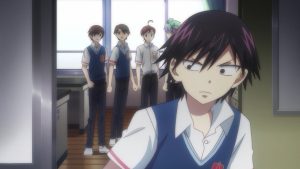 Without any question, “Popcorn Head” represents the best work the series has done (so far). It incorporates all the themes of the first six episodes and expands on them expertly, while adding in new elements that elevate the entire proceeding. This was beautiful and sad, deep and profound, funny and ultimately very touching. Shun is one of the best side characters you’ll ever see, and his story was told with wit and sophistication. And like so many great anime do, it used this episodic development to illuminate the two main characters in a very powerful way.
Without any question, “Popcorn Head” represents the best work the series has done (so far). It incorporates all the themes of the first six episodes and expands on them expertly, while adding in new elements that elevate the entire proceeding. This was beautiful and sad, deep and profound, funny and ultimately very touching. Shun is one of the best side characters you’ll ever see, and his story was told with wit and sophistication. And like so many great anime do, it used this episodic development to illuminate the two main characters in a very powerful way.
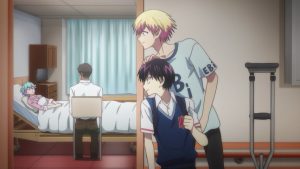 One interesting development I saw after last week’s episode is that there were some viewers (with an electron microscope powerful enough you can actually find a smattering of English discussion about this show on the net) defending Shun’s father. Frankly I find that very hard to comprehend, because even if you accept his right to decide his son’s future for him, he lied and told a little boy his mother was sick because of him. How can that be defensible in any definition of responsible parenting? Still, for all that I’m glad the character was taken in the direction of misguided (albeit very badly) rather than evil. It’s more realistic and lends the story (fantastical though it is) more realism.
One interesting development I saw after last week’s episode is that there were some viewers (with an electron microscope powerful enough you can actually find a smattering of English discussion about this show on the net) defending Shun’s father. Frankly I find that very hard to comprehend, because even if you accept his right to decide his son’s future for him, he lied and told a little boy his mother was sick because of him. How can that be defensible in any definition of responsible parenting? Still, for all that I’m glad the character was taken in the direction of misguided (albeit very badly) rather than evil. It’s more realistic and lends the story (fantastical though it is) more realism.
 Mom, as it turns out, is in the hospital with a bad back (I feel you, Ma’am). Shun eventually shows up at school looking pretty zombified, and Kuropi is immediately concerned about his friend’s (yes, Sensei is right – who’s the one kidding themselves about that?) emotional and physical state. The bag is fit to bursting with popcorn, and Kuro is sufficiently alarmed to ditch school and race to the hospital. He’s so dialed-in that Kuropi doesn’t even hear Sensei calling to him – until he calls him “Chibi”, that is. Kuro’s first instinct is to act alone, but he needs Ramune-sensei’s help on this one (and not for the last time).
Mom, as it turns out, is in the hospital with a bad back (I feel you, Ma’am). Shun eventually shows up at school looking pretty zombified, and Kuropi is immediately concerned about his friend’s (yes, Sensei is right – who’s the one kidding themselves about that?) emotional and physical state. The bag is fit to bursting with popcorn, and Kuro is sufficiently alarmed to ditch school and race to the hospital. He’s so dialed-in that Kuropi doesn’t even hear Sensei calling to him – until he calls him “Chibi”, that is. Kuro’s first instinct is to act alone, but he needs Ramune-sensei’s help on this one (and not for the last time).
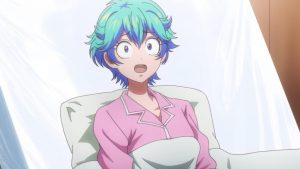 Shun takes after his mother, obviously. She’s more magnanimous than I would be after Sensei and Kuro spill the beans, but like her son she’s obviously a kind person to the core. The contrast between mother and father could not be more stark – he wants to smother his son so Shun’s talent won’t take him away, while she wants to see the exciting places the boy’s talent will take him. “Instead of picking that flower let’s nurture it, OK?” It’s a better verdict than that bastard of a father deserves, but a beautiful way to summarize the difference between good parenting and bad.
Shun takes after his mother, obviously. She’s more magnanimous than I would be after Sensei and Kuro spill the beans, but like her son she’s obviously a kind person to the core. The contrast between mother and father could not be more stark – he wants to smother his son so Shun’s talent won’t take him away, while she wants to see the exciting places the boy’s talent will take him. “Instead of picking that flower let’s nurture it, OK?” It’s a better verdict than that bastard of a father deserves, but a beautiful way to summarize the difference between good parenting and bad.
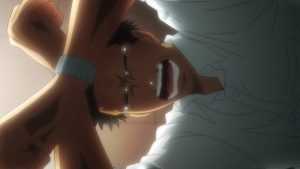 Unfortunately forcing Shun to suppress his nature has so broken him down that the lad decides to run away again. And while he’s realized the truth (it only took so long because creativity is not a conscious choice, but who he is), Shun’s decision to release his popcorn so that his sparkles can at least soar free if he can’t is lovely and poetically tragic turn. Fortunately for Shun he has a very good friend in Kuropi, who’s once more ready to run off and act on his own, but is reeled back in by Ramune-sensei. Kuro’s abject misery at his perceived failure elicits a rare bout of defeatism, but Sensei is their for him at his low ebb, and drags him back to himself to chase down Shun’s sparkles.
Unfortunately forcing Shun to suppress his nature has so broken him down that the lad decides to run away again. And while he’s realized the truth (it only took so long because creativity is not a conscious choice, but who he is), Shun’s decision to release his popcorn so that his sparkles can at least soar free if he can’t is lovely and poetically tragic turn. Fortunately for Shun he has a very good friend in Kuropi, who’s once more ready to run off and act on his own, but is reeled back in by Ramune-sensei. Kuro’s abject misery at his perceived failure elicits a rare bout of defeatism, but Sensei is their for him at his low ebb, and drags him back to himself to chase down Shun’s sparkles.
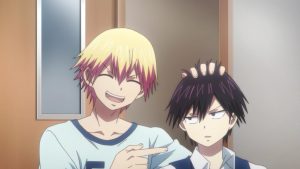 I just love everything about this end sequence – the symbolism, the emotional accuracy, the message behind all of it, and probably most of all the way it gloriously highlights what incredible characters Sensei and Kuropi are. Shun tried to set his creativity free, but Kuro reminds him that it can’t exist without him – Shun is the oxygen it needs to breathe. Kuro is willing to accept risk and pain to help his friend, and to protect the man he loves like a parent. He’s a noble little fellow, no question. And Shun is a pure and essentially good soul, childlike in the best possible way. As gut-wrenching as it was seeing his reaction to his creations at the shrine (my first allergy attack of the season) it was just as uplifting seeing him bloom as he was finally allowed to be himself again.
I just love everything about this end sequence – the symbolism, the emotional accuracy, the message behind all of it, and probably most of all the way it gloriously highlights what incredible characters Sensei and Kuropi are. Shun tried to set his creativity free, but Kuro reminds him that it can’t exist without him – Shun is the oxygen it needs to breathe. Kuro is willing to accept risk and pain to help his friend, and to protect the man he loves like a parent. He’s a noble little fellow, no question. And Shun is a pure and essentially good soul, childlike in the best possible way. As gut-wrenching as it was seeing his reaction to his creations at the shrine (my first allergy attack of the season) it was just as uplifting seeing him bloom as he was finally allowed to be himself again.
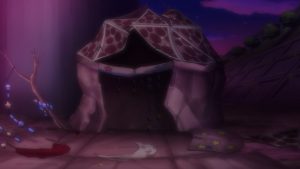 Not to gush, but that arc was just flat-out great – up to and including making sure we saw Sensei demand that Aona-san pay his – and Kuro’s – hospital bills. And Kuropi trying to secretly thank Sensei (and failing) was the perfect way to cap things. Those two are just wonderful characters, and the bond between them one of the most authentic and charming I’ve seen in anime in a long time. One might ask where Kai Byoui Ramune could go from here, but it’s the perfect time to up the ante by finally introducing Ramune-sensei’s sensei (for more than a Hitchcockian cameo). It seems like a great bit of decision-making by the anime – an adaptation which so far seems to be getting just about everything right.
Not to gush, but that arc was just flat-out great – up to and including making sure we saw Sensei demand that Aona-san pay his – and Kuro’s – hospital bills. And Kuropi trying to secretly thank Sensei (and failing) was the perfect way to cap things. Those two are just wonderful characters, and the bond between them one of the most authentic and charming I’ve seen in anime in a long time. One might ask where Kai Byoui Ramune could go from here, but it’s the perfect time to up the ante by finally introducing Ramune-sensei’s sensei (for more than a Hitchcockian cameo). It seems like a great bit of decision-making by the anime – an adaptation which so far seems to be getting just about everything right.


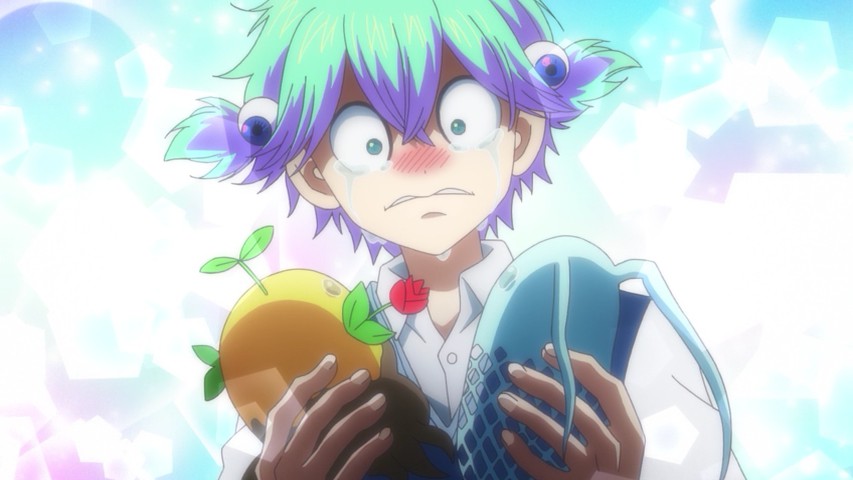


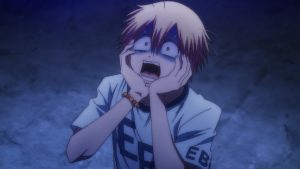



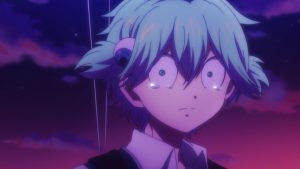

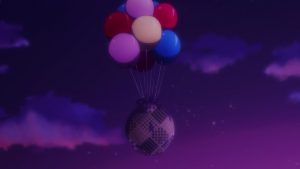


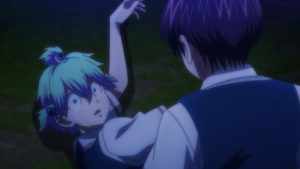
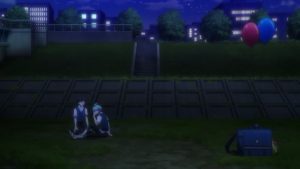
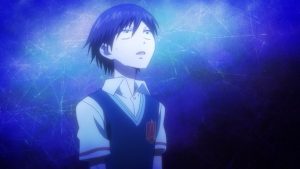
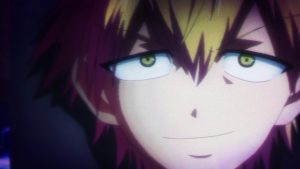

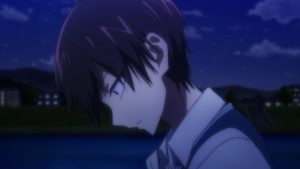
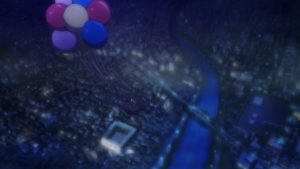
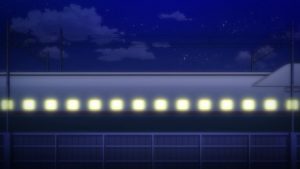
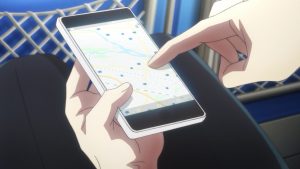
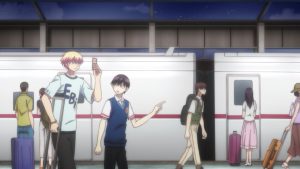
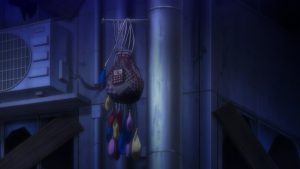




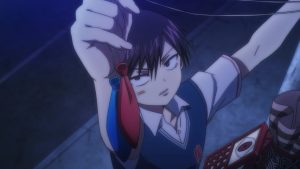

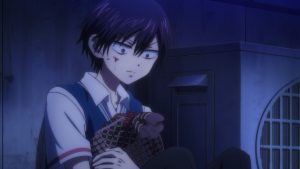
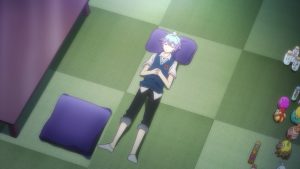
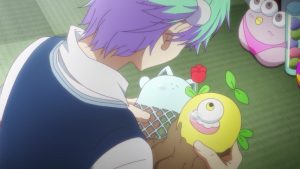


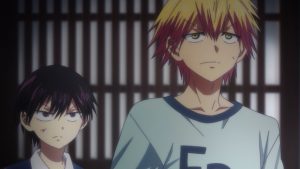

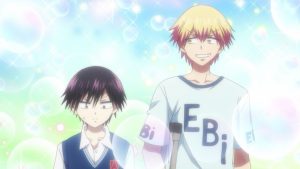
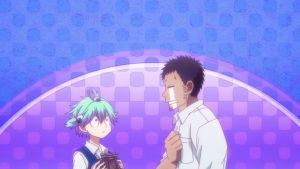

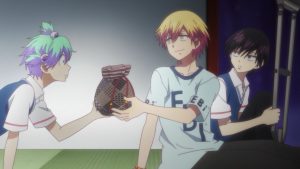

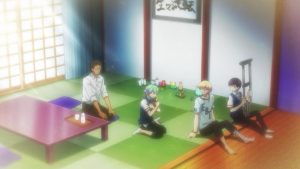

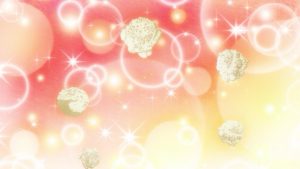
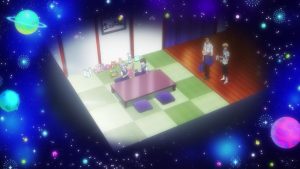
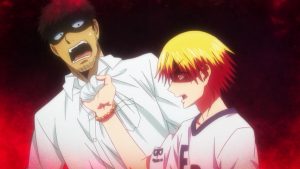
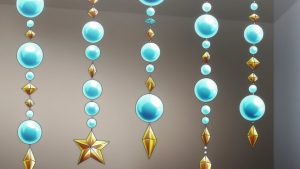
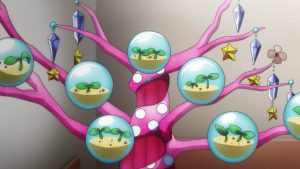
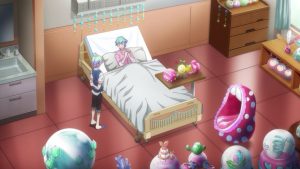

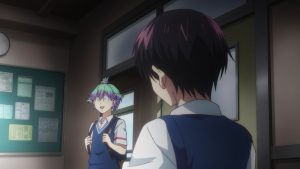
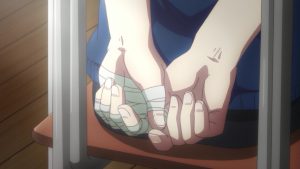
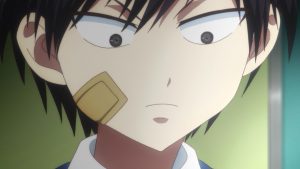
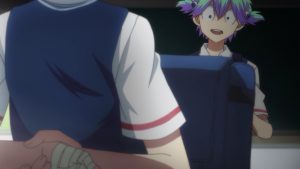
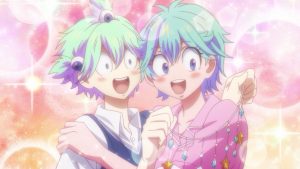

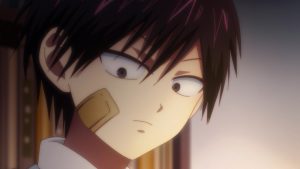
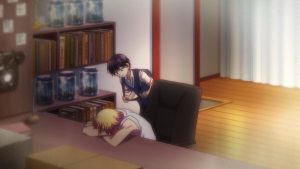


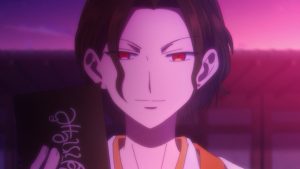
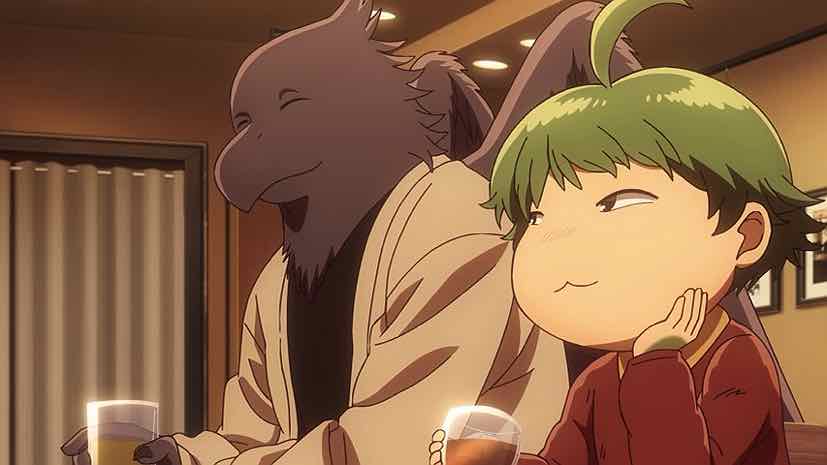
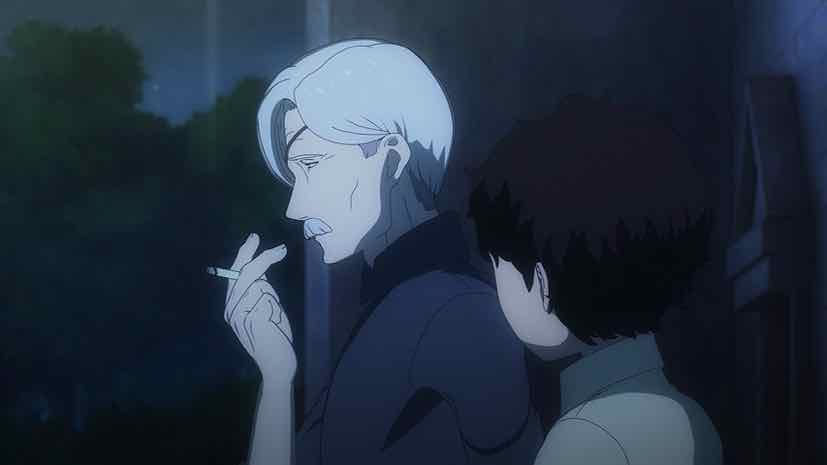
animealex
February 28, 2021 at 6:06 pmFirst of all, great episode indeed. The “chibi”, rewind noise, “wanna die” scene was my comedic highlight. And boy did Shun’s father got off lightly.
Second: That “cradle” (or wtf that is supposed to be) in your screenshot of Shun’s mothers hospital room will haunt me in my nightmares!
Third: It’s good we’ll finally met Ramune’s sensei, but I want to know more about Kuropi. Why is he always hanging around sensei and not his family? Where comes this inability to show (positive) emotions from? The fierce pride of being the one to help people and not the other way around? I hope he really got a friend in Shun, because he needs one. Btw. he acts like a child who’s neglected and has to look after his parents, not the other way around. Not a good thing, if true.
But yeah, the leads have “character” and live and breathe. And that is one of the best things to watch in a show.
Guardian Enzo
February 28, 2021 at 7:03 pmIt’s a lounger! Get comfy.
I suspect like all the other side characters, Sensei’s master will shed some light on both Sensei and Kuro, and their relationship. Probably even more so.
DP
February 28, 2021 at 7:05 pmMy apologies, but I feel like someone needs to weigh in here with an opposing viewpoint.
While I share some of your reservations about Wonder Egg Priority, at least that show is TRYING to do something different and interesting. This show, on the other hand, represents just about every lousy tendency of anime short of abundant fanservice. The writing is grindingly obvious; the scenarios are sickeningly melodramatic; and the “lessons learned” are the very definition of banal.
Honestly, Spongebob Squarepants is at least a million times more nuanced and clever in conveying its episodic morals than anything in Ramune.
Guardian Enzo
February 28, 2021 at 7:09 pmI don’t know why you felt someone “needed” to do that, but you have every right to do so of course. Obviously I strongly disagree, although this isn’t a series I would expect to go over well in 2021 in the first place (though it’s seemingly doing pretty well here).
I pretty much summed up my issues with WEP in my final post on it and have seen nothing in subsequent eps to change my mind. I’ll leave those enjoying it to enjoy it, since there’s nothing to be gained by trying to convince them not to (nor should I).
Derrick
February 28, 2021 at 9:06 pmany competent story in anime is always welcome.
Especially when it’s solemn and subdued.
Collectr
March 1, 2021 at 3:24 amShun’s Dad not only got off lightly; his transformation from evil dad trying to straight-jacket his son to besotted father fearing that his son will go abroad just did not ring true. The dad of this episode fits with Shun’s mom and her free-spirited nature, so I think the problem actually lies in the previous episode. The father was painted black to create a cliffhanger and a dilemma for Shun. To me, that’s just lazy writing.
Nonetheless, I’m enjoying this series quite a lot. I hope the writers don’t feel burdened by the need to have a Serious Development in the final three episodes.
Guardian Enzo
March 1, 2021 at 7:50 amI feel like serious developments would be pretty in-character though. We’ve already seen child murder and reprehensible parenting aplenty.
As to Aona-san, initially I felt the same way, but I thought in the end it pretty much made sense. Clearly the guy’s one card short of a full deck to begin with so his extreme reactions last week fit with his personality.
RB
March 1, 2021 at 10:43 pmI have such mixed feelings on this arc. On the one hand – Kuro’s a great character, and I quite enjoyed watching him develop interpersonal connections and get emotional. The hint of more to come was quite exciting.
But on the other hand – man, did that leave a bad taste in my mouth.
Dr. Ramune has always liked to dish out its consequences as gently as possible – which has worked fine with morals like “stop cheating on people” or “hey, get family therapy”.
But watching Shun’s dad work him to exhaustion, alienating him from his mother and friends, guilt-trip him and force him to abandon his passions in exchange for his father’s goals – ultimately leaving him as nothing more than an empty and joyless husk of his former self…
(I mean, this whole idea of Shun – no longer able to feel the things that he used to enjoy, making one last trip to school to see his classmates before going off on his own to “give up” the self that he sees as a burden on others – regretting it immediately, but unable to take back the decision. His panicked family and friends stumbling across his collapsed and broken body, blaming themselves for not having noticed sooner… It’s hard not to see real world parallels in that.)
But instead, the father’s only punishment is “Just say sorry and pay some money – everything is forgiven.” Made even worse by that having also been the exact same plot as the first episode.
I mean, I’ll still keep watching and probably enjoying. But this episode really drives home the slightly ugly tint Ramune has always had in every single one of its parent-child relationships. “It’s the child’s job to make sacrifices for the parent’s emotional shortcomings. Sometimes the parent goes too far, but it’s okay so long as they apologize afterwards.”
Guardian Enzo
March 2, 2021 at 6:53 amI get that but I have to say, I don’t see things quite that way. To me, the consistent thread has been that Ramune (and by implication, the series) are the advocate to protect children against unwise adults. If it goes easier on the parents than it might I think that’s to soft-pedal the messaging rather than defend their actions.
RB
March 3, 2021 at 6:10 amI suppose for me, the problem is that Ramune never really comes off as an advocate exactly. He does of course act with the goal of an eventual happy ending. But when a child comes to him, he doesn’t “protect” them like you would normally protect a child in an bad parental situation. Instead, he encourages them to try to solving the issue on their own – and then when they fail, uses their pain to teach the parents a lesson.
The parents never have to suffer directly – it’s just through watching the near-death of their child that they learn to be better people. Perhaps the instant forgiveness at the end is just a desire to end the episode on a happy note. But it comes off as unsettling after watching the child suffer so much and the parent so little. (Also strange, since Chikuwa the arc was comfortable with a “if you seriously betray someone’s trust, they may not forgive you” – message over much less severe actions.)
Guardian Enzo
March 3, 2021 at 7:49 amWell, I think figuring stuff out on your own and addressing the cause rather than the symptom is one of the series’ core themes. That extends to both the children and the adults.